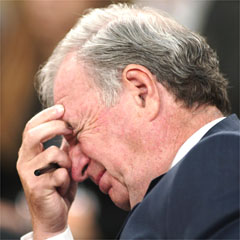Sometimes, I really wish I still had cable. Though I've got more DVDs than I can watch for now (will I
ever get through the three Woody Allen box sets? That's more of a pleasant problem) none of them are ever on when I'm surfing the Web. So it's early evening on a Saturday and the local news is on (that's CFCF, by the way). Before I realize that Seinfeld is probably on another one of the five stations I get (crap, why didn't I switch?!), I settle in.
Is there a more annoying aspect of modern life than the weekend evening newscast duo? The following is a word-for-word account of a real live exchange this evening, following a tearjerker of a story about a group of kids marching together against drunk driving. At the end of the shmaltzy report, the anchorpeople summed it up:
Anchorwoman: Good
story.
Anchorman (not missing a beat): Great cause.
Ugh.
The 22 minutes of "news" wraps up and the thirty-minute sports panel sausagefest begins. While I'm hunting for the damned remote, this week's panel of barely-literate morons begins to discuss Tiger Woods's <
insert excessively hyperbolic adjective here> performance at the Masters last week. The shmuck panel starts goes into Tiger Woods Fan Club mode, discussing his godlike characteristics, both on and off the course. Actual quote:
"He was one of the most charming guys I've ever interviewed. We [a group of reporters] had his back to the wall and he said, politely, 'if everybody could just step back a bit.' Wonderful."
Indeed. "Wonderful" is the
best word to describe a guy who asks you to move two spaces. And kudos on treating your interview subject with such dignity. The same reporter added the following, referring to the thought of picking up a $59 pack of Woods's signature balls (ho ho ho): "You're intrigued to buy it."
***
Sadly, local news really matters. And while inanity is fine when it comes to the weekly sports wrap-up, the actual
news, delivered by the plastic-heads who inhabit the anchor desk, counts for a lot these days. The cynicism that many North Americans feel about the news media tends to stick to the big shots alone - whether you're at least grade-three literate and you find Fox news to be the Republican wankfest that it is, or whether you're a mad-as-hell GOP wealthmonger who can't understand why the New York Times won't rag on homosexuals and immigrants. The major TV nets have done a particularly good job at heralding their lack of depth and credibility, simply by attacking each other and turning the volume up on their own supposedly good qualities. (Just how, exactly, is CNN's claim to be "the most trusted name in news" supposed to have meaning?)
National newspapers take a lot more shit than they get, but that's mostly because the neanderthals on Fox like nothing more than to lob feces at the "liberal" New York Times and Washington Post. Major dailies, though, are not nearly as tarnished (though there's quite a bit of nonsense going on at both the wire level - Google the AP's Nedra Pickler - and in your typical city daily - one doesn't have to look
far).
While synergy
may have worked at the accounting level (an economist can tell you whether AOL owning a whole chunk of media companies at various stages along the assembly line is worthwhile), it's rendered the news as we know terminal. And yet.
The local TV news, which has always been heavy on fluff, continues to matter (like the smalltown newspaper editorial page). At the very local level, outside the eye of those who delight in criticizing the press (including, sadly, me), many North Americans get their news. With the bullshit detector turned off and stored away in the bedroom closet, local news audiences are fed a super-sized portion of fast food. Some important stories get covered (local fires, missing children, municipal politics, etc.), but the amount of
Santorum processed through the PR machine and delivered into your living room, is terribly disheartening.
As network TV executives are
almost ready to realize that young people are
so over the news, government is getting in on the act of pre-fabbing news. The Bush administration has been criticized for its fake news delivery a number of times in the past year, and the president, in one of his prouder moments, asserts that no laws have been broken, thank you very much, now get the fuck out of my way. CNN operates a video news release service for local stations, providing content to resource-poor affiliates. It also makes money accepting and distributing phony video releases. Naturally, the network is
mum about the whole thing. The good folks at Fairness and Accuracy in Reporting lay it all out in their recent
annual report. Like the portrait of Dorian Gray, the picture ain't pretty and it's on a way-one ride to Ugly Town.
***
It's understandable to throw your hands up in the air. Hell, you can announce the death of the worst parts of traditional media, get your info from blogs and the Daily Show and feel pretty good about yourself.
But remember, if you should find yourself at home on an early Saturday evening with the TV on, for the love of all that is good, try and find a Seinfeld rerun, because the cocky plastic people who deliver the "news" have got a half dozen cute little quips just aching to come out.














